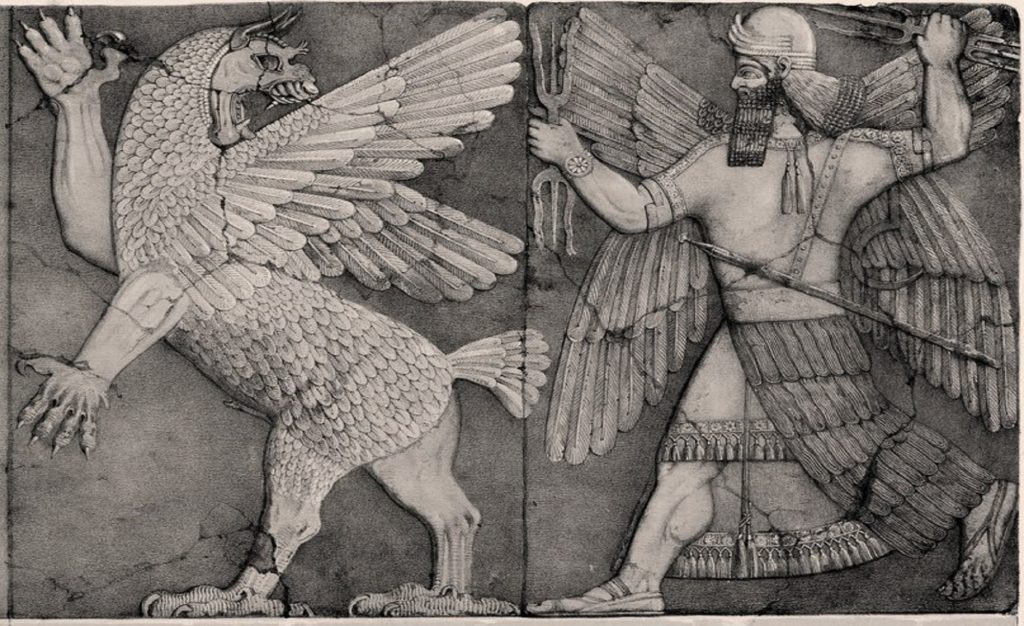The Book of Job lets us into God’s own account to tame the Leviathan when he berates the hapless Job for ask why oh, Lord, thinking he can understand what God is. God is saying like, you have no idea, little man, where I’m taking the Cosmos; you don’t even know how I created it.
What is a simple, unadorned account in Genesis: 2
Now the earth was unformed and void, and darkness was upon the face of the deep; and the spirit of God hovered over the face of the waters,” becomes in Job:
1 Can you pull in Leviathan with a fishhook
or tie down its tongue with a rope?
2 Can you put a cord through its nose
or pierce its jaw with a hook?
3 Will it keep begging you for mercy?
Will it speak to you with gentle words?
4 Will it make an agreement with you
for you to take it as your slave for life?
5 Can you make a pet of it like a bird
or put it on a leash for the young women in your house?
6 Will traders barter for it?
Will they divide it up among the merchants?
7 Can you fill its hide with harpoons
or its head with fishing spears?
8 If you lay a hand on it,
you will remember the struggle and never do it again!
9 Any hope of subduing it is false;
the mere sight of it is overpowering.
10 No one is fierce enough to rouse it.
Who then is able to stand against me?
11 Who has a claim against me that I must pay?
Everything under heaven belongs to me.
12 “I will not fail to speak of Leviathan’s limbs,
its strength and its graceful form.
13 Who can strip off its outer coat?
Who can penetrate its double coat of armor?
14 Who dares open the doors of its mouth,
ringed about with fearsome teeth?
15 Its back has rows of shields
tightly sealed together;
16 each is so close to the next
that no air can pass between.
17 They are joined fast to one another;
they cling together and cannot be parted.
18 Its snorting throws out flashes of light;
its eyes are like the rays of dawn.
19 Flames stream from its mouth;
sparks of fire shoot out.
20 Smoke pours from its nostrils
as from a boiling pot over burning reeds.
21 Its breath sets coals ablaze,
and flames dart from its mouth.
22 Strength resides in its neck;
dismay goes before it.
23 The folds of its flesh are tightly joined;
they are firm and immovable.
24 Its chest is hard as rock,
hard as a lower millstone.
25 When it rises up, the mighty are terrified;
they retreat before its thrashing.
26 The sword that reaches it has no effect,
nor does the spear or the dart or the javelin.
27 Iron it treats like straw
and bronze like rotten wood.
28 Arrows do not make it flee;
slingstones are like chaff to it.
29 A club seems to it but a piece of straw;
it laughs at the rattling of the lance.
30 Its undersides are jagged potsherds,
leaving a trail in the mud like a threshing sledge.
31 It makes the depths churn like a boiling caldron
and stirs up the sea like a pot of ointment.
32 It leaves a glistening wake behind it;
one would think the deep had white hair.
33 Nothing on earth is its equal—
a creature without fear.
34 It looks down on all that are haughty;
it is king over all that are proud.”
Look at the relief again of Marduk and Tiamat, a chaos deity (and the oceans represents chaos). God wouldn’t have this much trouble with an ordinary crocodile, whale, or hippo. It’s thought that this passage in Job is an allusion to the original beginning of the creation narrative with the defeat of cosmic dragon as read in the Enuma elish that was literally cut from the Hebrew version of the story. This got rid of having to explain how Yahweh came into existence since there are supposed to be no other gods, he’s the only one.
